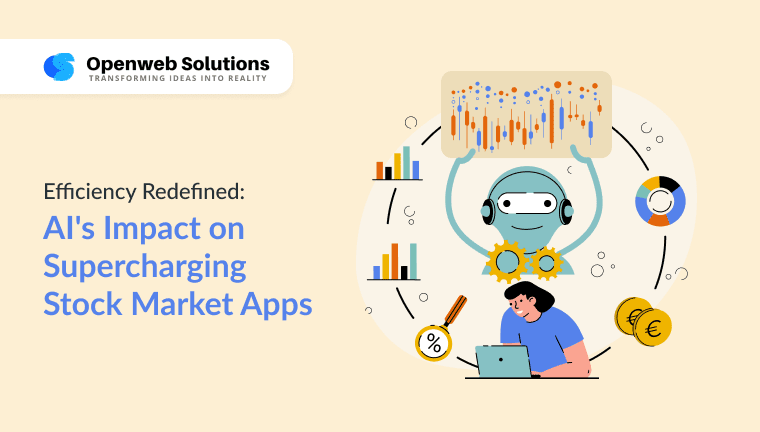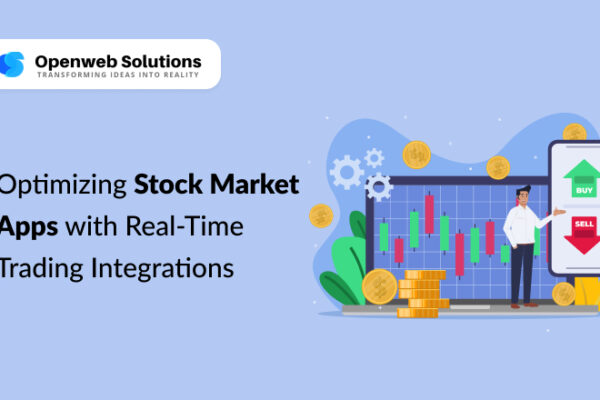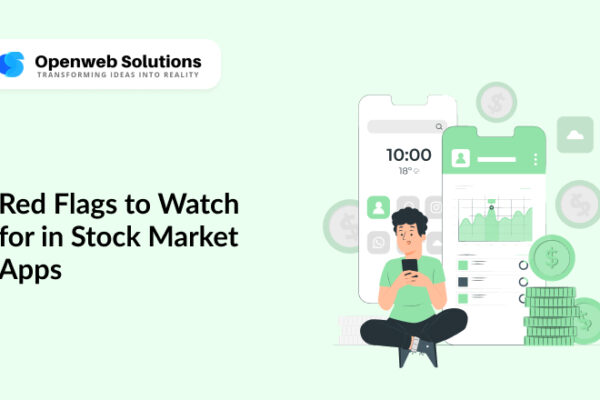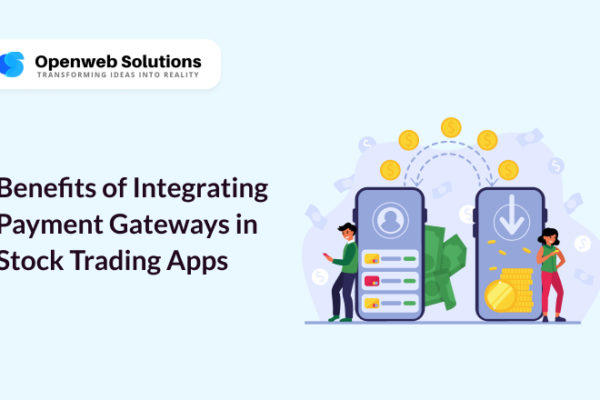Financial management and trading have become much easier with stock market apps. Stock market apps have revolutionized how investors engage with markets, offering real-time data, analysis, and trading capabilities at their fingertips. However, to remain competitive, these apps must continually innovate. Artificial Intelligence is the magic wand that can cast the spell of innovation in stock market apps. AI has a profound impact. Let’s delve into the impact of AI on boosting stock market apps.
5 Key Impacts of AI Integration in Stock Market Apps
1. Enhanced Insights
Stock market app development is undergoing a transformative shift with the integration of AI-powered analytics. Traditional apps rely on historical data and predefined algorithms to generate insights. However, AI algorithms can analyze vast amounts of data in real-time, identifying patterns, trends, and anomalies with unparalleled accuracy. By leveraging machine learning algorithms, stock market apps can provide users with personalized investment recommendations, predictive analytics, and risk assessments tailored to their unique preferences and risk tolerance.
2. Streamlined Trading Operations
Stock market software development aims to streamline trading operations for stock market app users. AI plays a pivotal role in optimizing trade execution, reducing latency, and minimizing slippage. Through advanced algorithms, stock market apps can analyze market conditions and execute trades with precision timing, ensuring optimal entry and exit points for investors. Moreover, AI-powered trading bots can automate repetitive tasks, such as portfolio rebalancing and order management, freeing up time for users to focus on strategic decision-making.
3. Empowering Decision-Making with Sentiment Analysis
Gaining insight into market sentiment is essential for making well-informed investment choices. Stock Market Website Development now incorporates sentiment analysis tools powered by AI to gauge the overall mood of investors. By analyzing news articles, social media posts, and other sources of information, these tools can assess whether market sentiment is bullish, bearish, or neutral. Armed with this insight, users can adjust their investment strategies, accordingly, mitigating risks and capitalizing on emerging opportunities in real-time.
4. Better User Experience with Intelligent Interfaces
User experience is paramount in the realm of stock market apps. AI-driven interfaces are revolutionizing how users interact with these platforms, offering personalized dashboards, intuitive navigation, and proactive assistance. Through natural language processing (NLP) and voice recognition technologies, users can access information and execute trades using simple voice commands or text queries. Additionally, AI-powered chatbots provide instant support, answering user inquiries and guiding them through complex financial concepts with ease.
5. Predictive Analytics for Portfolio Optimization
Portfolio management lies at the heart of investment strategy. Stock market app developers are leveraging AI to offer predictive analytics tools that optimize portfolio performance. These tools can forecast asset price movements, assess portfolio risk exposure, and recommend asset allocations based on market conditions and user preferences. By harnessing the power of AI-driven predictive modelling, investors can build diversified portfolios that maximize returns while minimizing downside risk.
Ready To Accept AI in Your Stock Market App?
If still not, then read the concluding paragraph below.
As the demand for innovative stock market apps continues to rise, AI emerges as a pivotal technology in redefining efficiency and performance. By harnessing the power of artificial intelligence, developers can create smarter, faster, and more user-friendly platforms that empower investors with actionable insights and seamless trading experiences. From personalized recommendations to predictive analytics, AI’s impact on Stock Market Apps is nothing short of revolutionary, paving the way for a new era of intelligent investing. Embrace AI and unlock the full potential of your stock market app today.
The FAQ’s.
FAQ 1: How do AI-powered analytics in stock market apps differ from traditional methods of generating insights?
Answer: Traditional methods of generating insights in stock market apps rely on historical data and predefined algorithms. In contrast, AI-powered analytics can analyze vast amounts of real-time data to identify patterns, trends, and anomalies with unparalleled accuracy. This allows for personalized investment recommendations, predictive analytics, and risk assessments tailored to individual preferences and risk tolerance.
FAQ 2: Can AI streamline trading operations within stock market apps?
Answer: Yes, AI plays a pivotal role in optimizing trade execution by reducing latency and minimizing slippage. Through advanced algorithms, stock market apps can analyze market conditions and execute trades with precision timing, ensuring optimal entry and exit points for investors. Additionally, AI-powered trading bots can automate repetitive tasks like portfolio rebalancing and order management, freeing up time for users to focus on strategic decision-making.
FAQ 3: How does sentiment analysis empowered by AI benefit investors within stock market apps?
Answer: Sentiment analysis tools powered by AI gauge the overall mood of investors by analyzing news articles, social media posts, and other sources of information. This insight helps investors understand whether market sentiment is bullish, bearish, or neutral, allowing them to adjust their investment strategies accordingly in real time, thus mitigating risks and capitalizing on emerging opportunities.
FAQ 4: How do AI-driven interfaces enhance user experience in stock market apps?
Answer: AI-driven interfaces revolutionize how users interact with stock market apps by offering personalized dashboards, intuitive navigation, and proactive assistance. Through natural language processing (NLP) and voice recognition technologies, users can access information and execute trades using simple voice commands or text queries. Additionally, AI-powered chatbots provide instant support, answering user inquiries and guiding them through complex financial concepts with ease.
FAQ 5: How do predictive analytics tools powered by AI optimize portfolio management in stock market apps?
Answer: Predictive analytics tools leverage AI to forecast asset price movements, assess portfolio risk exposure, and recommend asset allocations based on market conditions and user preferences. By harnessing the power of AI-driven predictive modelling, investors can build diversified portfolios that maximize returns while minimizing downside risk, thus enhancing their overall investment strategy within stock market apps.
Partha Ghosh is the Digital Marketing Strategist and Team Lead at PiTangent Analytics and Technology Solutions. He partners with product and sales to grow organic demand and brand trust. A 3X Salesforce certified Marketing Cloud Administrator and Pardot Specialist, Partha is an automation expert who turns strategy into simple repeatable programs. His focus areas include thought leadership, team management, branding, project management, and data-driven marketing. For strategic discussions on go-to-market, automation at scale, and organic growth, connect with Partha on LinkedIn.






